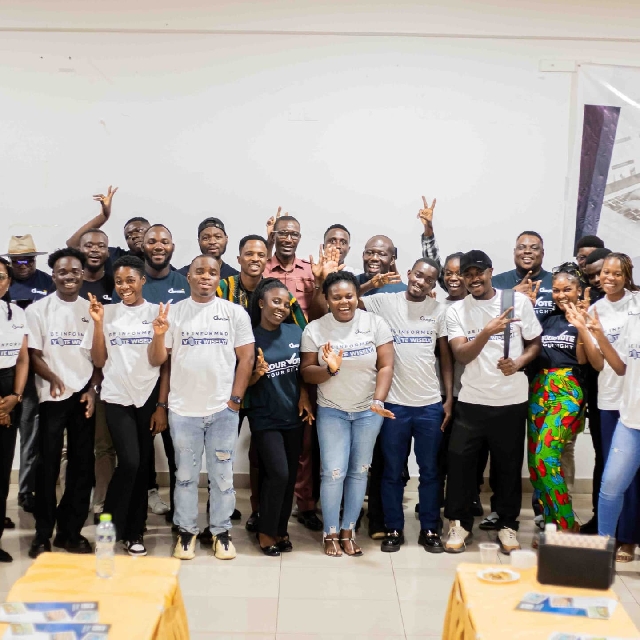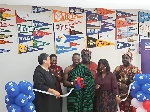Journalists, bloggers, influencers sharpen skills in fact-checking ahead on Dec polls
 Particpanst in a group photograph after the training in Accra
Particpanst in a group photograph after the training in Accra
Ahead of Ghana's December 7 general elections, Dubawa West Africa, a prominent fact-checking and investigative organization, has conducted a two-day fact-checking training programme in Accra for journalists, bloggers, and influencers on fact-checking.
The initiative aims to enhance the quality of information shared during the electoral period, equipping media professionals with skills to verify and authenticate information before, during, and after the election.
The training, which gathered a wide array of media figures, sought to foster a well-informed and discerning citizenry by empowering journalists and content creators to lead the charge in responsible information dissemination.
Facilitators covered a range of topics, including identifying information disorders, employing fact-checking methodologies, using digital tools, adhering to blogging ethics, and understanding the legal risks of spreading misinformation.
Roselena Ahiable, Project Manager at Dubawa West Africa, underscored the importance of fact-checking in countering misinformation, disinformation, and malformation.
She noted that many media professionals lack crucial information literacy skills, which inspired Dubawa to organize this targeted training.
“This training aims to bridge the knowledge gap and arm participants with the skills necessary to critically analyze the information they encounter, thus enabling them to provide the public with accurate and reliable news,” she stated.
Ms Ahiable explained that Dubawa West Africa, active in Ghana since 2019 and officially launched in 2020, has also extended its reach to rural journalists.
This expansion aims to address the shifting media landscape, where information is increasingly manipulated. She highlighted that journalists are becoming more aware of the powerful role information plays and are adapting accordingly, although there is still progress to be made in fully integrating fact-checking practices across media outlets.
Dr. Aurelia Ayisi, a lecturer at the University of Ghana's Department of Communications, emphasized the role of digital technologies in democratizing the media space.
She pointed out that bloggers, influencers, and content creators now command significant influence, challenging traditional media’s hold on information.
With elections on the horizon, Dr. Ayisi called for collaboration among these groups to prioritize accuracy over speed, warning that the electoral process's integrity could be compromised by the spread of false information.
She stressed that accurate and reliable information is essential for voters to make informed decisions, making the role of media professionals more crucial than ever during the election season.
Speaking at the event, Affail Monney, the immediate past President of the Ghana Journalists Association (GJA), urged journalists, bloggers, and influencers to uphold media ethics, emphasizing the importance of balance, fairness, reliability, and timeliness in their reporting.
Mr Monney highlighted the responsibility of the media to provide accurate, unbiased coverage and to investigate political candidates thoroughly.
He reminded media practitioners to avoid personal biases and partisan influences and to help safeguard Ghana’s democracy through responsible journalism.
Additionally, Monney called on the media to ensure equal opportunities for political parties and candidates to communicate their policies to the public, underscoring the media’s vital role in promoting transparency and accountability during the electoral process.
Source: Classfmonline.com/Cecil Mensah
Trending News

EC to destroy recalled ballot papers for Western, Eastern regions today at 4 PM
13:22
RISKSPOT launches in Ghana to tackle cybersecurity
10:53
EC identifies ballot paper shortfalls in Volta Region, plans immediate reprinting
02:32
US Embassy: 14k American students studying in Ghana
14:14
NDC accuses NPP of printing fake ballot papers ahead of Dec. 7 elections
10:08
Bawumia promises National Pilgrimage Authority if elected President
17:48
Special voting takes off in 14 regions, Eastern and Western rescheduled
08:03
E/R: Akufo-Addo opens Akim Oda ultra-modern market complex
02:00
GA/R: Education USA Advisory Centre launched in Osu
14:15
Reject NPP MPs recall of Parliament; it doesn’t meet the required threshold – 'NDC Majority Caucus' to Speaker
09:00




